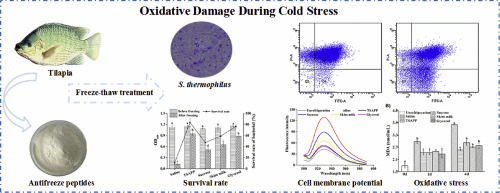当前位置:
X-MOL 学术
›
Food Chem. Toxicol.
›
论文详情
Our official English website, www.x-mol.net, welcomes your
feedback! (Note: you will need to create a separate account there.)
Effects of gelatin-based antifreeze peptides on cell viability and oxidant stress of Streptococcus thermophilus during cold stage.
Food and Chemical Toxicology ( IF 3.9 ) Pub Date : 2019-12-14 , DOI: 10.1016/j.fct.2019.111056 Xu Chen 1 , Ling Li 2 , Fujia Yang 3 , Jinhong Wu 4 , Shaoyun Wang 3
Food and Chemical Toxicology ( IF 3.9 ) Pub Date : 2019-12-14 , DOI: 10.1016/j.fct.2019.111056 Xu Chen 1 , Ling Li 2 , Fujia Yang 3 , Jinhong Wu 4 , Shaoyun Wang 3
Affiliation

|
Cold stage adversely affects cell proliferation and cell viability of probiotics such as Streptococcus thermophilus in food industry, new type of cryoprotectants continues to be needed. Gelatin-based antifreeze peptide becomes a popular topic because of its cryoprotective effects on cold-stressed probiotics. In this study the effects of tilapia scales antifreeze peptides (TSAPP) on cell viability and oxidant stress of S. thermophilus during cold stage were investigated. The results showed that the percentage of viable cells was increased 10.85 folds compared with control groups. Addition of TSAPP activated the activities of ATPases, relieved the hyperpolarization of cell membrane potential and regulated the intracellular Ca2+ concentration. Furthermore, TSAPP significantly inhibited reactive oxygen species level and malonaldehyde content in cells. Under cryopreservation with TSAPP, cells of S. thermophilus maintained higher activities of antioxidant enzymes including catalase, peroxidase and total antioxidant capacity. These findings indicate that TSAPP likely offered its cellular protection by maintaining membrane integrity and alleviation of oxidative stress.
中文翻译:

明胶抗冻肽对嗜热链球菌冷期细胞活力和氧化应激的影响。
低温阶段会对食品工业中嗜热链球菌等益生菌的细胞增殖和细胞活力产生不利影响,因此仍然需要新型冷冻保护剂。基于明胶的抗冻肽因其对冷应激益生菌的冷冻保护作用而成为热门话题。本研究探讨了罗非鱼鳞抗冻肽(TSAPP)对低温阶段嗜热链球菌细胞活力和氧化应激的影响。结果显示,与对照组相比,活细胞百分比增加了10.85倍。TSAPP的添加激活了ATP酶的活性,缓解了细胞膜电位的超极化,调节了细胞内Ca2+浓度。此外,TSAPP 显着抑制细胞中的活性氧水平和丙二醛含量。在TSAPP冷冻保存下,嗜热链球菌细胞保持较高的抗氧化酶活性,包括过氧化氢酶、过氧化物酶和总抗氧化能力。这些发现表明 TSAPP 可能通过维持膜完整性和减轻氧化应激来提供细胞保护。
更新日期:2019-12-17
中文翻译:

明胶抗冻肽对嗜热链球菌冷期细胞活力和氧化应激的影响。
低温阶段会对食品工业中嗜热链球菌等益生菌的细胞增殖和细胞活力产生不利影响,因此仍然需要新型冷冻保护剂。基于明胶的抗冻肽因其对冷应激益生菌的冷冻保护作用而成为热门话题。本研究探讨了罗非鱼鳞抗冻肽(TSAPP)对低温阶段嗜热链球菌细胞活力和氧化应激的影响。结果显示,与对照组相比,活细胞百分比增加了10.85倍。TSAPP的添加激活了ATP酶的活性,缓解了细胞膜电位的超极化,调节了细胞内Ca2+浓度。此外,TSAPP 显着抑制细胞中的活性氧水平和丙二醛含量。在TSAPP冷冻保存下,嗜热链球菌细胞保持较高的抗氧化酶活性,包括过氧化氢酶、过氧化物酶和总抗氧化能力。这些发现表明 TSAPP 可能通过维持膜完整性和减轻氧化应激来提供细胞保护。











































 京公网安备 11010802027423号
京公网安备 11010802027423号